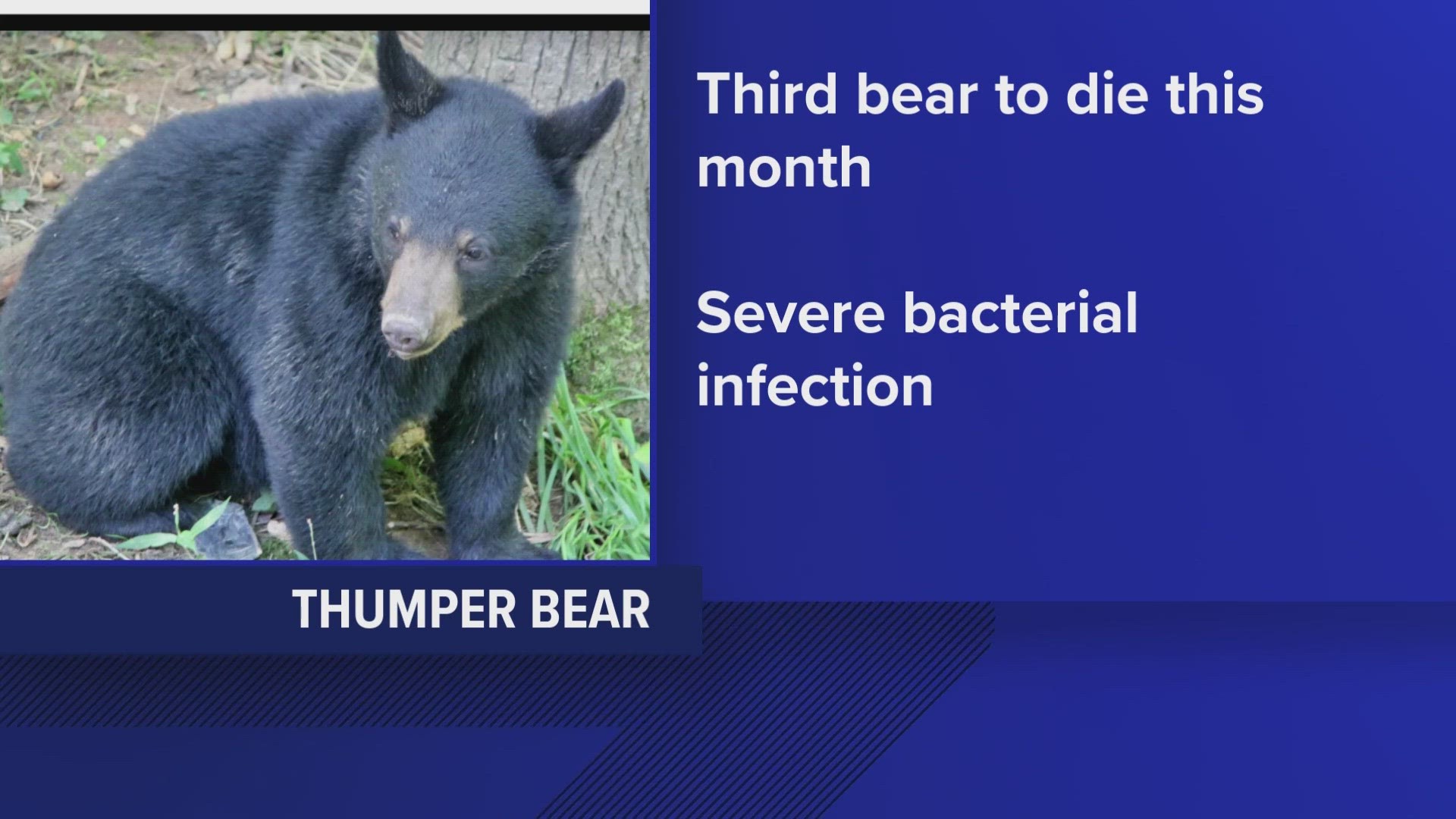TOWNSEND, Tenn. — A third cub died at Appalachian Bear Rescue, the nonprofit said on Monday. The rescue said Thumper Bear died of the same infection that killed two other bears — Burrito and Flapjack.
The rescue previously said veterinarians with the University of Tennessee College of Veterinary Medicine identified a strain of Streptococcus bacteria as a possible cause of the illnesses. ABR said the doctors had tested for coronavirus and distemper virus, and said previous cubs that died did not have evidence of viral pneumonia, indicating that the cause was likely bacterial.
They also said they were searching for the source of the bacteria.
ABR said Thumper Bear took "a sudden turn for the worse" Monday afternoon, after a good night and a good morning. They said UTCVM veterinarians were caring for the bear, but could not do more to prevent to prevent the infection from spreading.
"To intervene again would just serve to postpone the inevitable. The curators concurred with their assessment and informed the TWRA who agreed it would be best to release Thumper from his suffering," ABR said on social media. "The good vets made one last visit to our facility."
He died on Oct. 23, 2023. ABR previously reported him as being sick, but said curators found him Monday morning with less of a cough and said he wasn't breathing as much through his mouth. ABR said when he did cough, he was eliminating mucus from his lungs. The bear had taken its medication and had eaten all of its food, along with another bear — Tamale.
ABR said on social media that Tamale seemed well Monday evening.
"We thank the TWRA for introducing Thumper into our lives and for the courage to allow him to leave. We’ve taken you, our friends, on a terrible rollercoaster ride; this bacteria is like nothing we’ve ever faced. Thank you for supporting us, even when it hurts," ABR said on social media.
The TWRA also released a statement about Thumper and the deaths. It is available below.
"TWRA has confirmed a black bear cub has been humanely euthanized due to respiratory illness caused by the streptococcus bacteria commonly referred to as strep. The bears were being rehabilitated by Appalachian Bear Rescue (ABR). University of Tennessee College of Veterinary Medicine (UTCVM) identified two strains of the bacteria in the sick cubs. One was a strain commonly found in poultry.
'While it can be hard to determine a definitive source, the bear could have been exposed to the bacteria from poultry, chicken litter, or wild birds before arriving to ABR,' said Dr. Dan Grove, TWRA Wildlife Veterinarian. 'The strain is highly contagious and could be easily spread between bears with compromised immune systems.'
Strep tends to thrive in the lungs and often leads to bacterial pneumonia, which happened to these cubs. Pneumonia is difficult enough to treat when you can readily access the patient but when you have an animal like a wild bear, it makes it more difficult to administer aggressive treatments. The most likely scenario is that the cubs had been exposed prior to being orphaned and the immunity they were getting from their mother’s milk eventually waned while in captivity. Combined with the stress of being orphaned it creates a weakened immune system that allows for strep to flourish.
Over the last two decades, ABR has been very successful at rehabilitating black bear cubs. TWRA’s mission is to manage and conserve wildlife populations, and ABR’s work is critical to the success of black bear populations. Because TWRA does not have rehabilitation facilities, the only other options for sick and injured cubs would be to take no action and leave them in the wild for nature to take its course. Cubs receive excellent care from UTCVM and ABR and we applaud their extensive efforts.
While unfortunate, sickness is often inevitable. The agency is confident cubs at ABR are in the best place to receive care. Three other cubs were in the same enclosure as the sick cubs, and ABR and UTCVM plan to continue monitoring the status of their health."
The TWRA said while Thumper was euthanized, the two others died due to respiratory illness. The three other cubs that were in the enclosure with the sick cubs had also shown symptoms, the TWRA said, but are recovering after getting care from UTCVM.

